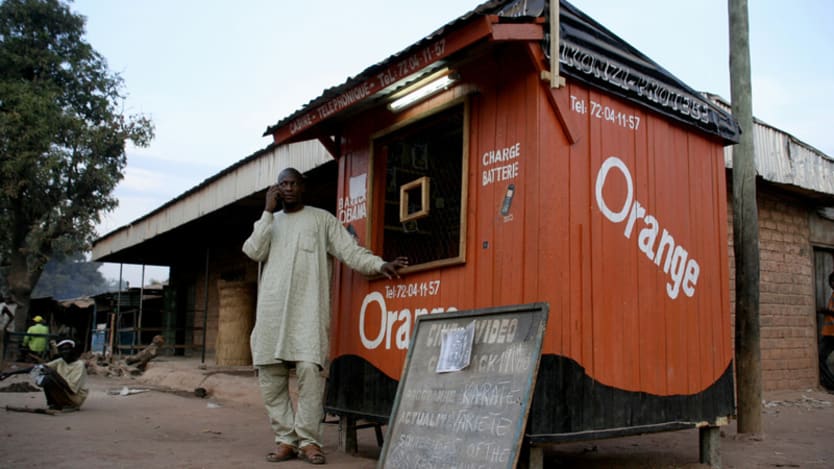
BARCELONA — When it comes to innovating in development, we need to take risks and accept and learn from failure, according to the U.K. Department for International Development’s Research and Evidence Division’s senior innovation adviser, Magdalena Banasiak.
Speaking to Devex at last month’s Mobile World Congress, Banasiak said that approaching innovation in a way that is agile, flexible, and accepting of the fact that not everything will work is the key to finding sustainable solutions to global challenges.
“Really, it's staying ahead of the curve and when we talk about innovation, it's not just around technology, but it’s different business models, different ways we can work, and being able to take risks,” Banasiak said, whose role focuses on building an evidence base of what works and applying it to development challenges.
She called for the sector to become more comfortable with failure, explaining that only through discovering what doesn’t work can it figure out what does work.
“What we haven’t done in the past is really learn much from the startup sector, really prototype, and be more agile before we make massive investments.”
— Magdalena Banasiak, senior innovation adviser, DFIDBanasiak explained DFID’s approach to innovation, the lessons learned so far, and how the department is changing the way it is working.
The interview has been edited for length and clarity.
Why does DFID see innovation as important?
We need to acknowledge the increasingly digital world that we live in. It's not that innovation is synonymous with digital, but it's making the most of new technologies and the digital economy. We want to ensure the countries and the populations we work with are not left behind and that they reap the digital dividends and the benefits of what some of these technologies can do.
It's also requiring us to change the way we work in DFID. Being lean and agile is something that we're trying to very clearly apply within our programs. We’ve closed programs that aren’t working or pivoted them, and I think that requires a certain level of trust with partners, a comfort level around that ability to be flexible in terms of the way we work.
Can you tell us more about your work at DFID?
A major part of my work is working with the mobile industry and GSMA [a group that represents the interests of mobile operators worldwide and organizes Mobile World Congress], through a strategic partnership program, Mobile for Development, in terms of looking at how we can harness the mobile sector and support new business models. It's everything from providing early-stage risk capital for innovations such as [mobile money transfer platform] M-Pesa, mobile money, and financial inclusion to then using that as an underpinning platform to provide other services like water and sanitation or energy.
Our work with GSMA focuses on a number of strands: We have our work on mobile-enabled agriculture, mobile-enabled utilities, and how we can use digital platforms and payment services to really bring those services to the last mile; everything from your well-known M-Kopa to other providers who are less well-known. WonderKid in Kenya are setting up payment solutions for utilities to enable them to have a broader reach for their market and be able to reinvest in their infrastructure through some of the digital payment platforms they have.
We’re also supporting a range of different business models, whether it's around m-agriculture — so mobile-enabled agricultural services for farmers — and really trying to [figure] out what the business model is there ... Some of the companies that we’ve supported in that space are companies like Twiga, which is a digital platform that helps farmers access markets in more cost-effective ways, cutting out the middleman so they get a better price for their products.
It's about finding that sweet spot between delivering the social outcome, the development outcome, and the commercial opportunity … [so there is] the ability to scale solutions.
More on innovation:
► Innovation at DFAT: Resilience is key
► Q&A: A criticism of the 'innovation narrative'
► Opinion: Innovation often fails to scale — maybe we can fix it
One of the other areas we are involved in is “connected women” — providing market insights to the sector around some of the barriers around access to digital services for women ... We’re trying to unpack that problem and identify solutions with the mobile operator on how they can improve those services to address the inclusion of women.
I'm also looking internally with DFID at how we build our capability in terms of technology. Across our offices, it's really trying to encourage them to get to have that flexibility, to be able to test some of these technologies.
What lessons have you learned in this role so far?
There have always been pockets of innovation and as a development community, we are innovating all the time in terms of our approaches, learning, and building of evidence. But what we haven’t done in the past is really learn much from the startup sector, really prototype, and be more agile before we make massive investments.
We need a bit more learning on the job rather than waiting for a five-year program to end. We need to be able to adapt and be more flexible. I don't think the way that we've structured our programs has always allowed us to do that, so actually changing the way that we design programs and work with partners is critical.
Search for articles
Most Read
- 1
- 2
- 3
- 4
- 5








